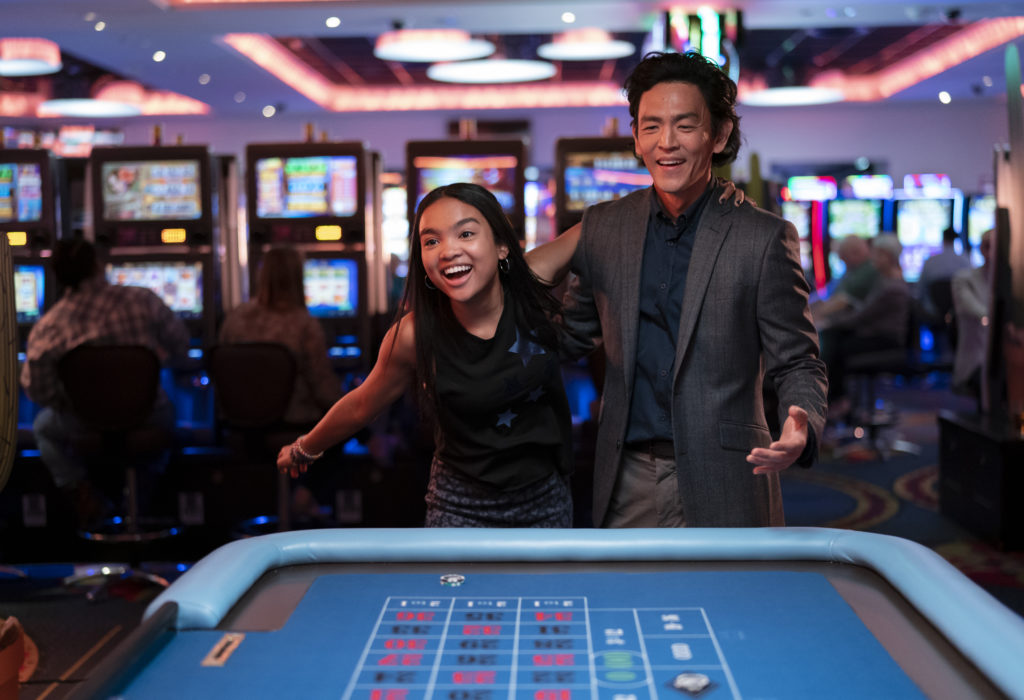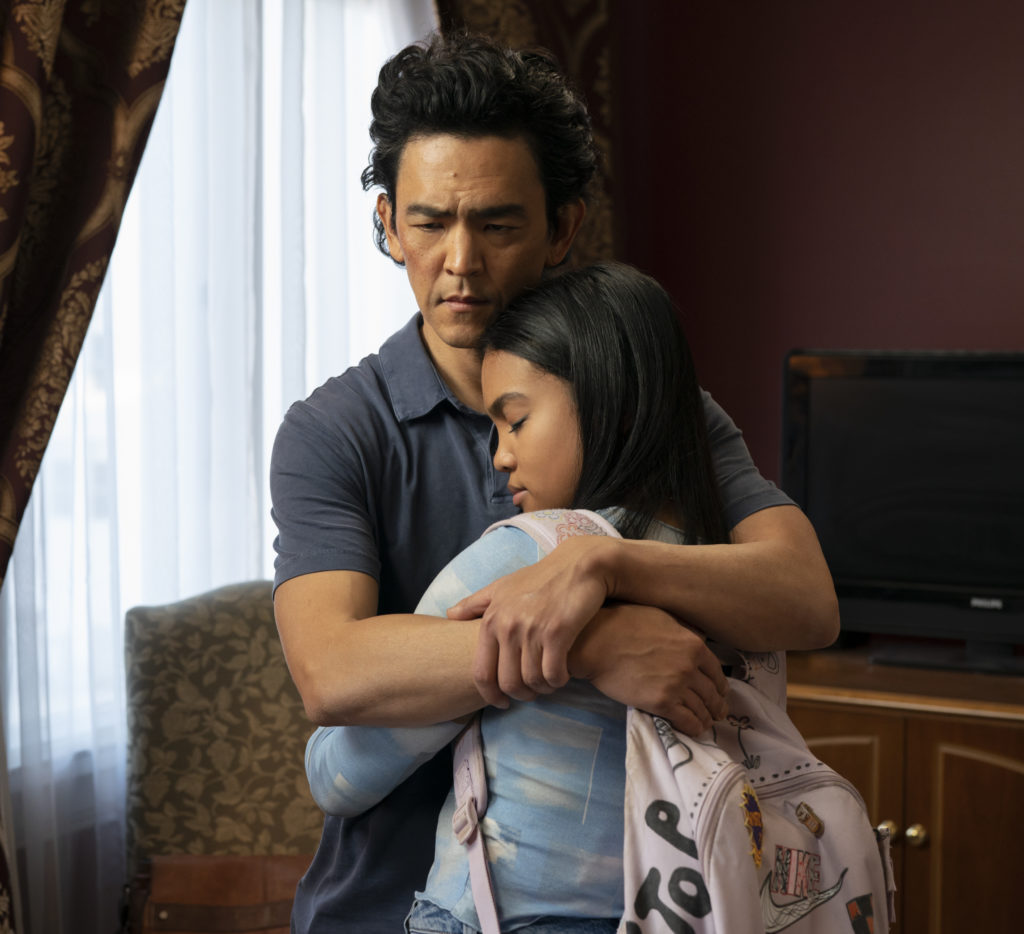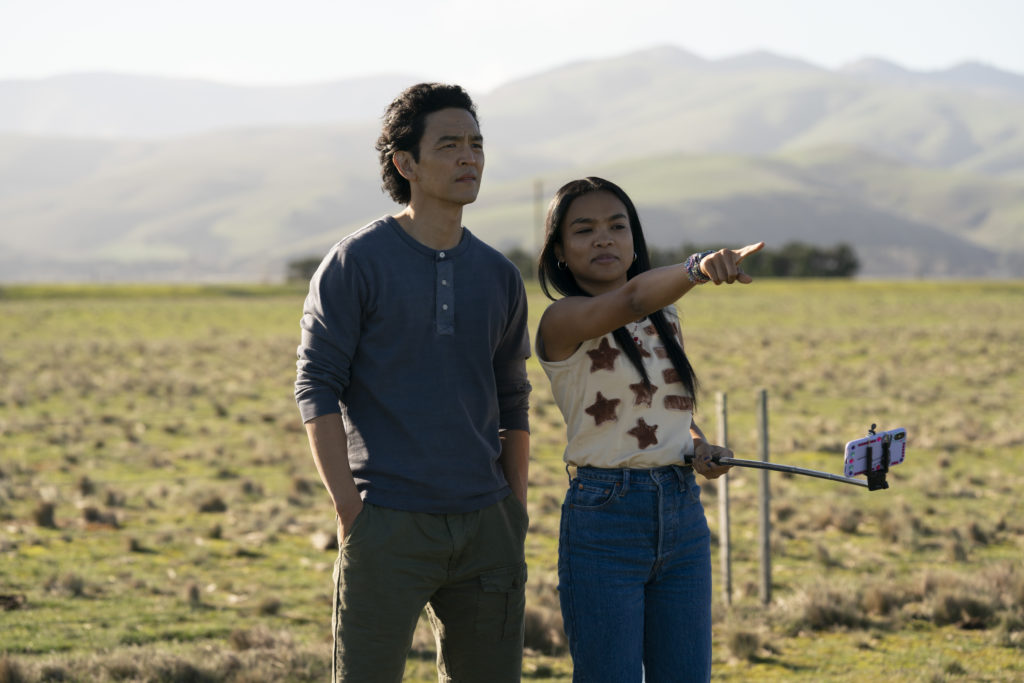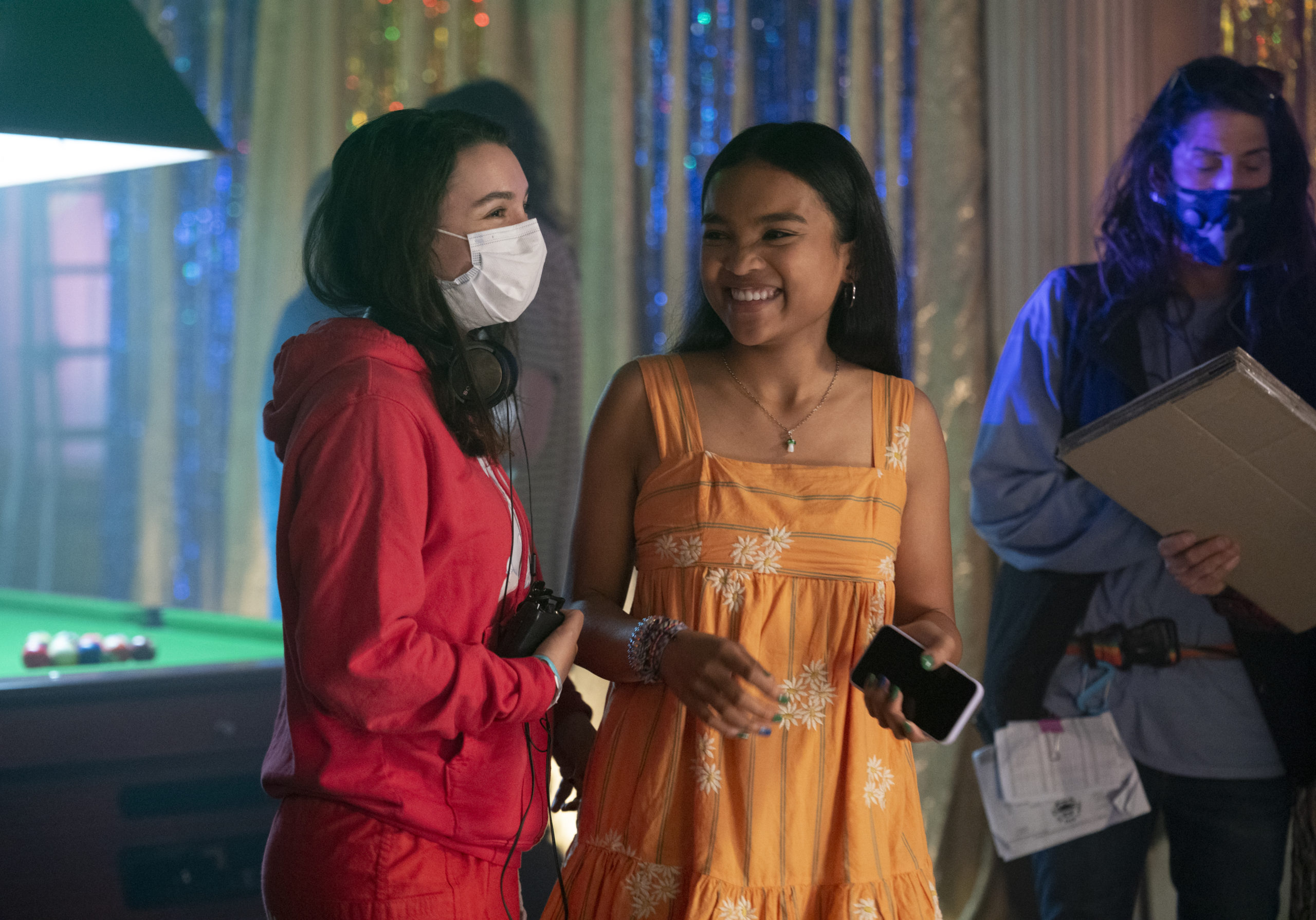In Don’t Make Me Go (currently on Prime Video), John Cho and newcomer Mia Isaac play a father and daughter on a road trip, both coming of age—as a forty-something and a teen—and coming to terms with their often acerbic relationship. Directed by Hannah Marks, the picture presents dual stories of two generations, neither of which has it all figured out, and a single parent and youth facing a series of crises and revelations.
Marks, the accomplished twenty-nine-year-old actress, writer and now director, a veteran of TV’s Ugly Betty, Weeds and movies including The Runaways and The Amazing Spiderman, is an impressively emerging multi-hyphenate and old pro at a young age, assuredly guiding her actors though a gauntlet of disconnects toward eventual and hard-won resolution.
And eighteen-year-old Isaac, an ebullient young talent working over a decade for her big break whose career is now perfectly poised for take-off, puts her heart into the picture (which was made when she was just sixteen) and into co-star Cho, displaying confidence, humor and pathos.
I caught up with Hannah Marks and Mia Isaac at Chicago’s Four Seasons hotel for a chat on the film’s multiple, ambitious agendas, and was delighted by the young pair’s take on the film, its characters and themes and their enthusiasm about their futures, which appear limitless, in the American movie industry.
Mia, this must be an exciting time for you.
Mia Isaac: Yes! Also nerve-wracking! I am more of an introverted person and I act because I love it, not because of all the red-carpet stuff though that’s something that comes with it. I did not anticipate that it would be so much!
You’ve loved it since you were ten years old.
MA: Yes, since I was younger. I started officially acting and auditioning when I was ten.
Why did you connect with the role of Wally?
MA: I don’t know how I couldn’t. For me, as a teenager the same age as Wally, it felt so easy for me to understand where she was coming from and all of her feelings and emotions. We were going through all of the same things in our lives with just being a teenager and boys and your parents being annoying and coming of age. I really related to her from the beginning.

Hannah, speaking of parents being annoying, I think the movie does fine job of balancing parallel stories by giving equal weight to parents and children.
Hannah Marks: Thank you!
I think when we all grow up we look at our parents and ascribe one dimension to them, which is that their job is to raise us. They don’t have their own lives, at least that we would consider. There is a certain point where we realize they have their own concerns. Can you talk about that and giving equal weight to your co-protagonists?
HM: Yeah. I always viewed it as a coming-of-age story for both of them. Just because Wally is the one who is almost sixteen doesn’t mean that Max can’t come of age in his forties as well. I think they were dealing with similar things and not realizing it and could not communicate it. So much of their relationship was unspoken. It was about exploring that tension and making them both feel equal because it was both of their stories, even though Wally narrated it.
John Cho is terrific here. You really wanted him for this, and I think it was perhaps originally written differently. Why him for this role? I assume you’ve seen him in everything he’s ever been in.
HM: It actually wasn’t written any differently—it was just originally intended for white actors. I think just because it was a Caucasian screenwriter. And to me reading the script, there was nothing about race that mattered. I just wanted the best people for the roles. And John is so incredible. I really, really loved him in so many things. And I love that he has a comedy background, but also has great dramatic chops and he can sing. And he’s just terrific. I definitely have not seen everything he’s ever done.
You saw Columbus?
HM: I saw Columbus. I thought that was excellent. I’ve seen the Harold and Kumar movies, or course. I loved him in Searching, which was also a father-daughter story though the daughter wasn’t as present in that one. I just thought if he could bring that much humanity through a computer screen in that film then there would be no limits to what he could do in this movie.
Mia, can you share a bit about collaborating with him? I understand he was a go-to for you emotionally during the shoot as well.
MI: For most of the movie it’s just us in the car or in the house. We spent almost every day together and even off set because I was in a foreign country and I had no idea where I was going. So he would take me out to lunch or dinner. We’d do some touristy things and even when we traveled together to the South Island we’d find things to do.
HM: We shot in New Zealand. That is why she is saying the South Island.
MI: I think off screen he guided me in the way that a parent would guide their child. And I think that’s what made the onscreen chemistry so great, because it reflected how we were in real life.

How much of you is in this film?
MI: Oh my God, so much. When I watched the movie with my parents for the first time, I was like, my whole life is in this movie, you know? I mean all of my childhood videos and all of the photos are in this movie. The video of Max and Wally talking about all the things that Max says in that video—it’s what my dad actually said to me in the real video. He has a pet lizard, which was something that wasn’t in the script and was added because I have a pet lizard. I haven’t said this before but my voice is in the song at the end- Hannah had me hum along to the song and my actual voice is in that.
HM: It feels like you should get a soundtrack credit now.
MI: I don’t love it! What I love about Hannah is that she cares so much about the details, and you wouldn’t automatically pick up that that’s my voice, but it feels so special that it is.
HM: I think there’s a lot to be said for things that are subconscious and layered and textured. Originally, her childhood videos were meant to just be given to John so that he could get to know Mia as a kid and really feel like her father. But those videos were so special that we ended up including them in the movie. And I love those happy accidents and surprises that just add another emotional layer to the project.
New Zealand is an interesting location in which to shoot.
HM: John Cho was living there at the time, and we were all pretty set on having John play Max. And also there were zero cases of COVID in New Zealand at the time. So it just was really safe. And for a movie about family, it just felt important to keep everyone feeling safe and loved and cared for. So that was how it started. But yeah, not what you would expect for an American summer road trip movie because it was winter in New Zealand!
I love the notion here that there is a father who wants to share certain life lessons with his daughter and given his situation there are some deep reflections. Mia, what is something your dad has imparted to you?
MI: Oh my gosh, my dad- I think for me as an actor, he’s always been the most supportive person in my life. He was the one who always convinced me to keep going and to not give up when I was auditioning for years and never hearing back. He was the one who always told me to take risks and bet on yourself. I struggled a lot with college. I’m at that age where I’m trying to decide if I want to go to college or not, and he’s the one who’s advocating for me not to go to college because he wants me to pursue my dream. It’s not that he doesn’t want me to go to college, but he knows that acting is what I love. He has always advocated for me to take a leap of faith.
Can you both talk about the big scene about 20 minutes before the end of the film, involving a confrontation outside of the car between father and daughter? It is the emotional apex. Mia, I wasn’t at last night’s screening, but I have to imagine that people were moved by your performance in that scene. I’d love to hear a little about that moment from both of you.
MI: We did not do that scene in the audition, and I loved that Hannah did not have us do it. You might think that (a director) who was being practical might audition you with quite possibly the hardest scene in the movie to see what you’re capable of. But I remember Hannah said specifically that it wasn’t fair to have us do that in the audition.
HM: I know how much pressure you put on yourself to make a scene like that one great and how much work would go into that. And it didn’t seem fair when you’re not paying someone yet. It didn’t feel appropriate. And I think I was lucky enough to get to know Mia as an actress without having seen that scene, and I just felt like she could do it and trusted her. Trust is such an important part of our relationship too.
MI: And I think that’s what I loved about it is because I hadn’t done it in an audition. We rehearsed a couple of times, but I hadn’t really spoken the words aloud that much and I hadn’t given them meaning yet. So when we went to actually shoot, it was the first time I really gave meaning to the words, and it felt fresh, like I was saying it all for the first time.
One thing that impressed me was that as it went on it became a lot of things. To begin with, there’s the teen story and there’s the adult story. There is also a father-daughter family reunification story. There are the high school reunion friends—the kind you may have your whole life who will end up being there for you. And then there’s the road movie, which is classic movie tradition. I think you did a great job integrating all of those into a single narrative.
HM: I just liked that it felt like they had full lives and that their whole lives didn’t just revolve around each other. And really, I was just trying to follow what felt real based on my own gut and what I thought the characters would be doing and caring about. And I think if you follow that you can’t go wrong. I think people can go wrong trying to balance all of those things when they’re forcing some kind of selfish agenda. And for me, I just wanted to do justice to Max and Wally’s characters.

Hannah, you grew up in the industry and you’ve done everything—you’ve acted, you’re now directing and much more. At what point did you decide you wanted to make that transition to directing? Was there a formative moment where you knew you wanted to take it to the next level and become the boss?
HM: I don’t see myself as the boss even though that’s a very fun title! I was about Mia’s age when I did the Sundance Lab, which is a workshop for directors. I was there as an actor, and I just had the best experience. It was like filmmaker summer camp. And I was already interested in writing and directing just from having acted since I was a little kid, but that really cemented it for me. It was just such a creative space where there was so much freedom to explore and take risks and things that are relevant to the themes of this film. And that really changed it for me. I mean, the directors that were there now have all gone on to be highly acclaimed, like Mariel Heller and Chloe Zhao. So that was a hugely important experience.
You must have absorbed quite a bit over the years from your directors. As a director, what’s the most important thing that you can do for an actor like Mia while you are together on set?
I think a lot of directors have different approaches and some directors play mind games. I don’t think that that’s cool at all. I like to be very direct and honest. I think we get the most from each other when we’re just honest and communicative. And so for Mia, I really just wanted to be direct with my notes to her and tell her exactly what I was hoping for, but also still be kind and supportive and respectful of her process. And I wanted to keep her in the loop for anything she wanted to know or to protect her from anything she didn’t want to know. So if she wanted to know what the camera angle was or how many takes we would do, I would want to share that with her because every actor has a different process. If she didn’t want to know that, then I wouldn’t tell her—but I just wanted the choice to be up to her.
Do you think of yourself as an emerging “female filmmaker” or as a filmmaker in Hollywood? I recently spoke with a high-profile female director who said she did not want to be referred to as a female filmmaker anymore but rather just a filmmaker.
I guess I see myself as both. I feel lucky to be in a woman in the industry today because right now it is in the zeitgeist and there’s an advantage because people are excited right now about female directors. That is such a wonderful, wonderful thing and way overdue. I think that’s great. That being said, I don’t approach directing like from this “Oh, I’m a woman” lens—I’m just trying to serve the story.
What do each of you think about in terms of where the industry is today and the types of projects or roles that you would like to see yourselves in? Certainly, the Marvel universe, for example, is commercially popular and many actors and directors have gone there.
MI: I’m grateful that this audition was even open to me as maybe 20 years ago it would’ve been (played by) a white girl. I’m also grateful that I get to audition for roles that aren’t stereotypical. I’m grateful to have worked with John, who was one of the first people not to play the stereotypical Asian guy. And he’s had such diversity in his roles. And so I look up to him in that way. In terms of what I’d want to do next, I do love Marvel. I would love to be in a Marvel movie. Funny you mentioned that.
I don’t think they’re going to make any more of those (laughter).
HM: I think Mia would be a terrific Disney princess too. Oh, gosh, I’m sorry. I need to stop saying that if they do a live action Moana…
MI: I would love that.
HM: For me, I want to do bigger and bigger projects. Of course I will always still go back to indie roots and make some personal, smaller stories. But for now I’m hoping to keep growing—whatever that may be.
What is the best part about your jobs?
MI: I’m loving the travel. This is my first time in Chicago, and I get to come here.
HM: We just saw The Bean.
Oh, that’s fun.
MI: And got to go to New Zealand. I don’t think I would’ve ever been to New Zealand in my entire life if I wasn’t an acting. Next week I’m going to Jamaica for acting too. I feel so lucky that I’m getting to see the world through the lens of what I love to do the most. That feels like such a gift.
HM: What do I love the most? My favorite part of the process is editing. That’s such a big joy for me. You’re getting to be so creative and put together a puzzle with your actors whom you love so much, whereas writing can be very isolating and lonely. And in this process, you’re getting to watch these people that you love and respect so much and create a new piece of art out of it. So that for me is the most enjoyable part.
Don’t Make Me Go is currently available on Prime Video.



